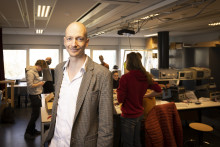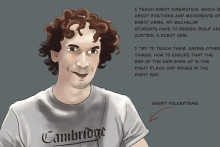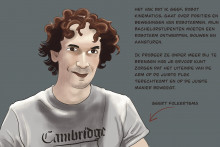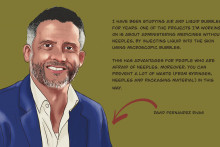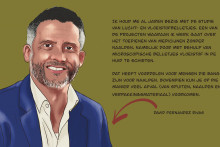Faber started working as a teacher within Creative Technology around ten years ago. He has been awarded a Create teaching award twice; once in 2014 and again in 2016. According to Faber, he owes the second award in particular to the class of students he was teaching. The rapport he felt with his students at the time, as far as Faber is concerned, was vital in terms of winning the prize; after all, no two classes are ever the same. Sometimes, as a teacher, you are faced with a generation with very little cohesion but, in 2016, everyone really pulled together. Faber believes that a teacher has an important role to play herein, by creating a climate which is nourishing and in which collective effort is tangible.
Barren
Faber cannot elaborate on his role as a teacher without mentioning the situation during the lockdowns. He understands that everyone did their best to get through this period but the barren nature of an environment without physical contact has had, in his opinion, a profound impact. He has become much more aware of the need for and importance of human contact and the physical elements of teaching. This is what motivates him. Faber believes that the most important lesson is never to teach in that way again. He is now seeing groups of students who are less well developed socially than other groups simply because there was little consideration for the situations of young people.
Faber was also shocked by the academic climate during the pandemic. Specifically, by the fact that some issues could not be critically assessed, that there was an atmosphere full of taboos, in which opinions were good or bad, without a central ground where there was a meeting of minds and ideas. This triggered something in him. He believes that the climate in which academia can thrive was put under huge pressure. Scepticism can generate questions that are worthy of investigation and which push science forward. This suddenly became a no-go area.
Faber never expected to be standing here with ten years' teaching experience behind him. He uses this as a lesson for his students. Not everything can be scheduled in a five or ten-year career plan. A more adventurous route can also pay dividends and lead to success. He just happened to come into contact with a group of amazing people who had started the Creative Technology course. He was drawn to their pioneering spirit, and the sense that he was always missing something was suddenly resolved.
Full speed ahead
Over the past few years, Faber has benefited from his expanding experience. It has served him well, made him calmer and allowed for greater improvisation in his lessons. He can draw from a richer, more fertile base. He sees this as a layer of ‘fertiliser’ which is further fed and nourished by his experiences. Simultaneously, he sees the world becoming more complex; an engine that is getting faster and faster. According to Faber, it sometimes feels as if modern technology is making everything much easier for students while, at the same time, the use of technology means our heads are becoming increasingly overloaded. With this in mind, it is worth asking whether students have greater control as a result of this technology or whether the technology is effectively controlling the students.
Passion. That is Faber’s short and to-the-point answer when asked what makes him a good teacher. He believes a student can tell, within seconds, whether a teacher is really engaged in what they are doing. Faber also appreciates being able to integrate social themes within his subject area and finds it important to be inspired by role models. He mentions two of these role models, from very different periods of his life.
One was a teacher at his primary school. A huge bear of a man, who used to play around with the pupils on a Friday afternoon. It was a ‘fight’ that the kids always lost but Faber describes it as an interaction that effectively captured the sparring that occurs between teacher and pupil. His second role model is professor Miko Elwenspoek, who died last year at the age of 72. According to Faber, he was a huge source of inspiration; he was not only able to captivate students with his lectures but was also able to interact with students on their level.
Faber tries to do this every day. For example, by seeking the boundaries of physics from a philosophical perspective. After all, in his opinion, issues are sometimes so interconnected that when you arrive at a point where physics can no longer offer an explanation, awe can simply take over. And it is often at that moment that teachers and students realise that knowledge is so much more than a chunk of information.
As far as Faber is concerned, there are two important aspects in the changing role of the teacher. A teacher can become a much greater role model if he considers how students live. Personal and professional development are generally kept separate but, in his opinion, a combination of the two would be better suited to a university that focuses on knowledge. As a fan of martial arts such as Tai Chi, he recognises principles in the this that ought to be included within education. These could offer a stable basis and also help regulate stress. Faber believes that stress affects not only your mind but also your body and his ability to regulate this stress has benefited him throughout his life and is something he would like to pass on to his students.


